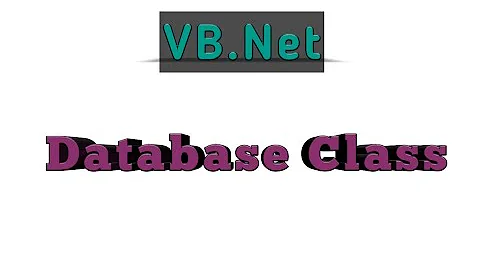Creating data model class for database handling
Solution 1
What you are referring to as a 'model class' is more commonly known as a data access object (DAO). Your model would usually be a set of classes that hold your data and business logic. In you case, probably a Student class having an ID, name, GPA, etc. properties. If you want to separate data access from your model, you would have your data access class (DatabaseHelper) query the database and use the data it gets to return Student objects or a List<Student>. There is really not much point in separating the data access class from the database helper, it is better to have all of your database-related code in one place.
Using model classes (only), however, may not always be practical on Android, because it has native support for getting and displaying data from a Cursor (CursorAdapter, etc.). If you want to use any of that, you would have to expose your data not as model objects but as Cursor's. As for content providers, have a look at those too, but if you don't need to expose your data to other applications, writing a ContentProvider might be overkill.
On another note, you don't want to be opening and closing the database on each query. It is actually safe to leave it open, it will be automatically closed when your app's process dies.
Solution 2
I do this in my application and it works wonderfully, the code is clean and it doesnt impact performance at all, especially with the hardware phones have today. I tried all of the other approaches and even used a content provider but it just over complicated things in my opinion.
Related videos on Youtube
Admin
Updated on June 04, 2022Comments
-
 Admin almost 2 years
Admin almost 2 yearsI was just starting to work on an database application when I realized I should implement
MVCpattern as the application is quite complex and involves a number of database operations.
In regards to this, I have decided to create a separatemodel classfor handling database operations. This class will have all methods which will return me the data after executing Sqlite command(Select for instance) OR will simply execute the SQLite command(Delete for instance). But what I want is to separate this class fromDatabase Adapterclass, where I open, create and close my database.
Let me put my concept into code :public class DataModel { /* Private members */ // Method to Select data from Student table public ArrayList<String> FetchStudents (parameter 1) { private ArrayList<String> arrStudent; DatabaseAdapter objDB= new DatabaseAdapter(); objDB.open(); /* Some code */ objDB.close(); return arrStudent } //Method to delete record from Student table public DeleteStudent(parameter 1) { DatabaseAdapter objDB= new DatabaseAdapter(); objDB.open(); //Some code objDB.close(); } /* Rest of methods */ }//DatabaseAdapterClass
private static class DatabaseHelper extends SQLiteOpenHelper { DatabaseHelper(Context context) { super(context, DATABASE_NAME, null, DATABASE_VERSION); } /** * onCreate method is called for the 1st time when database doesn't exists. */ @Override public void onCreate(SQLiteDatabase db) { Log.i(TAG, "Creating DataBase: " + CREATE_STUDENT_TABLE); db.execSQL(CREATE_STUDENT_TABLE); } /** * onUpgrade method is called when database version changes. */ @Override public void onUpgrade(SQLiteDatabase db, int oldVersion, int newVersion) { Log.w(TAG, "Upgrading database from version " + oldVersion + " to " + newVersion); } }Question:
What I want to ask is this the correct approach of implementation? Is it fine if create separate class for database methods? What limitations or issues you guys think might trouble me later on? Also, is there a better way to implement the above concept?Thanks
Stone






